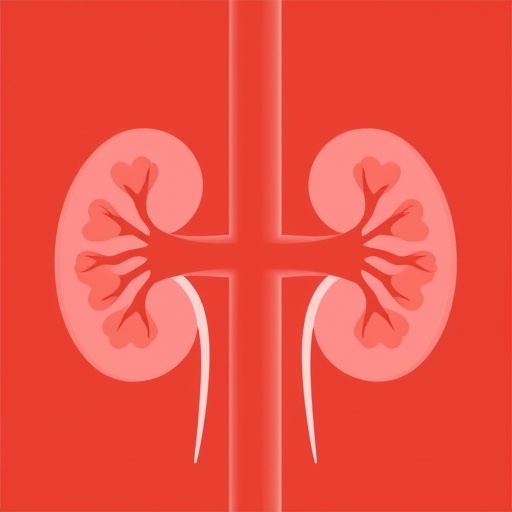A landmark clinical study now emerging from the forefront of nephrology research signals a transformative advance in the management of kidney diseases associated with type 2 diabetes, chronic kidney disease (CKD), and heart failure. The comprehensive analysis provides compelling evidence supporting the routine use of sodium-glucose cotransporter 2 (SGLT2) inhibitors, a class of medications initially developed for glycemic control, as powerful agents in improving kidney outcomes across an extensive range of renal function and albuminuria levels. This breakthrough expands our understanding of SGLT2 inhibitors beyond their glucose-lowering properties, highlighting their significant role in renal protection that could redefine therapeutic standards worldwide.
For decades, kidney diseases, particularly those linked to diabetes and heart disease, have posed a daunting challenge to clinicians due to their progressive nature and limited treatment options. The emergence of SGLT2 inhibitors has started to reshape this landscape. These drugs function by blocking the reabsorption of glucose in the proximal tubules of the kidney, promoting glycosuria, but this glycemic mechanism is only the tip of the therapeutic iceberg. The latest evidence delineates a multifaceted biological impact, including reductions in intraglomerular pressure, attenuation of renal fibrosis, and modulation of inflammatory and oxidative stress pathways.
What sets this study apart is its rigorous evaluation of SGLT2 inhibitors across diverse patient populations with varying degrees of kidney function and albuminuria. Historically, the efficacy of such treatments was often constrained by concerns over kidney impairment or the severity of proteinuria. However, this extensive meta-analysis reveals consistent renal benefit irrespective of baseline kidney function—from early-stage mild decline to advanced chronic kidney disease—demonstrating the versatility of SGLT2 inhibition as a nephroprotective strategy. This is a paradigm shift that challenges the previous reservations about deploying these therapies broadly.
At the biochemical level, SGLT2 inhibitors ameliorate hyperfiltration—a hallmark of diabetic nephropathy—by promoting tubuloglomerular feedback and reducing excessive glomerular pressure that drives progressive kidney damage. This effect preserves nephron integrity and slows the decline in glomerular filtration rate (GFR). The agents also appear to confer anti-inflammatory effects within renal tissues, likely through downregulation of key cytokines and chemokines involved in fibrosis and injury propagation, thus interrupting the vicious cycle of chronic inflammation and renal scarring.
Moreover, SGLT2 inhibitors contribute to systemic hemodynamic improvements that indirectly benefit renal health. Their natriuretic effect leads to reductions in blood volume and blood pressure, mitigating the impact of hypertension, a principal risk factor for kidney disease progression. The improved cardiovascular profile of patients receiving these drugs underscores the intertwined nature of kidney and heart health, particularly in those suffering from heart failure, where volume management is critical.
The study also underscores the importance of albuminuria as not just a marker but a therapeutic target. Albuminuria, signifying increased permeability of the glomerular filtration barrier, is a predictor of renal decline and cardiovascular events. By attenuating albuminuria regardless of initial levels, SGLT2 inhibitors effectively modify the disease trajectory, preventing escalation and potentially delaying or averting end-stage renal disease (ESRD).
From a clinical standpoint, the implications are vast. The integration of SGLT2 inhibitors into routine nephrology practice represents a shift towards precision medicine, tailoring interventions based on comprehensive risk profiles while maximizing renal and cardiovascular protection. This approach is consistent with emerging guidelines that advocate early initiation of SGLT2 inhibitors in appropriate patients to forestall complications and improve long-term outcomes.
In terms of safety, the study addresses the careful balance of risk versus benefit. While prior concerns existed regarding the use of SGLT2 inhibitors in patients with severely reduced kidney function, the data affirm that these agents maintain efficacy without significant adverse renal effects. This reassures clinicians and patients alike, facilitating broader adoption and potentially influencing policy for treatment coverage across healthcare systems.
The underlying clinical trials included in the meta-analysis reflect robust methodologies, encompassing randomized controlled trials and large, diverse cohorts. Such rigor enhances the generalizability and confidence in applying these findings across different populations, including those historically underrepresented in clinical research. It demonstrates the global relevance of SGLT2 inhibitors as a cornerstone in kidney disease therapy.
Furthermore, the pathophysiological insights gleaned from this research offer fertile ground for future innovation. Understanding the intricacies of SGLT2 inhibitors’ impact on renal cellular mechanisms propels the quest for new therapeutic targets, combination regimens, and possibly earlier intervention strategies in diabetic and non-diabetic kidney disease alike. These findings therefore have the potential to catalyze a new era of kidney disease management.
Presented at the American Society of Nephrology Kidney Week 2025, these results underscore the transformative potential of SGLT2 inhibitors in clinical nephrology. The collective data advocate for a revision of treatment algorithms, encouraging health care providers to adopt these drugs sooner and more widely, thereby improving the prognosis for millions suffering from kidney disorders globally.
In conclusion, this comprehensive body of evidence solidifies SGLT2 inhibitors as critical therapeutic agents that not only manage hyperglycemia but also exert profound nephroprotective effects. Their routine use for patients with type 2 diabetes, chronic kidney disease, and heart failure represents a significant leap toward mitigating the global burden of kidney disease. Continued research and clinical vigilance will further define optimal application modalities, ensuring that the benefits of these drugs are fully realized in everyday practice.
For further inquiries or detailed discussion on the study, the corresponding authors Dr. Brendon L. Neuen and Dr. Hiddo J. L. Heerspink are available for contact, exemplifying collaboration and transparency in scientific communication—a hallmark of advancing medical knowledge.
Subject of Research:
Article Title:
News Publication Date:
Web References:
References:
Image Credits:
Keywords: Kidney, Inhibitory effects, Filtration systems, Type 2 diabetes, Diabetes, Heart failure, Renal failure, Medical treatments
Tags: albuminuria levels and kidney diseasechronic kidney disease managementclinical study on kidney medicationsglycemic control and kidney functionheart failure and kidney disease connectionimpact of SGLT2 inhibitors on glomerular filtration ratesinflammatory pathways in kidney healthrenal protection from diabetes treatmentsSGLT2 inhibitors and kidney healthSGLT2 inhibitors and renal fibrosissodium-glucose cotransporter 2 medicationstransformative advances in nephrology research





